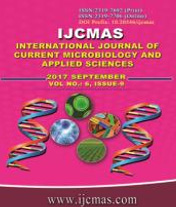


 National Academy of Agricultural Sciences (NAAS)
National Academy of Agricultural Sciences (NAAS)

|
PRINT ISSN : 2319-7692
Online ISSN : 2319-7706 Issues : 12 per year Publisher : Excellent Publishers Email : editorijcmas@gmail.com / submit@ijcmas.com Editor-in-chief: Dr.M.Prakash Index Copernicus ICV 2018: 95.39 NAAS RATING 2020: 5.38 |
Soil represents one of the most diverse habitats for more than a thousand million bacterial species present on the earth. The maintenance of soil quality, fertility and structure is essential for the protection of the biodiversity and integrity of terrestrial ecosystems. Introduction of anthropogenic chemicals into soil may have lasting effects on soil microbial activities and thus soil health. Chlorpyrifos is a broad spectrum organo phosphorus insecticide, displaying insecticidal activity against a wide range of insects and other arthropod pests. It is characterized as moderately toxic compound with acute oral LD50 = 135–165 mg kg-1. Therefore, it was essential to determine the behaviour of chlorpyrifos in soil and to evaluate the responses of soil microorganisms to repeated application. This information will be useful for predicting the environmental fate of this widely used insecticide from continuous use and for understanding the potential adverse effects of intensive treatments with chlorpyrifos on general soil bacteria and biochemical properties. Hence this study was conducted with chlorpyrifos to evaluate its effect on soil bacteria Two bacterial strains capable of utilizing chlorpyrifos as a sole source of carbon and energy for growth were isolated 15 d after third treatment of chlorpyrifos which indicated the capability of soil microorganisms for degrading chlorpyrifos was formed during the experiments. The two bacterial strains capable of utilizing chlorpyrifos were isolates TB251 and TB252. These two bacteria were further studied for Identification and characterization. The two strains showed different results for the biochemical tests suggesting genetic diversity of the population.
 |
 |
 |
 |
 |